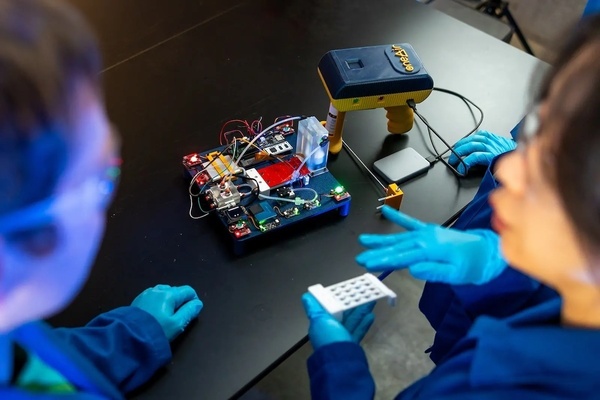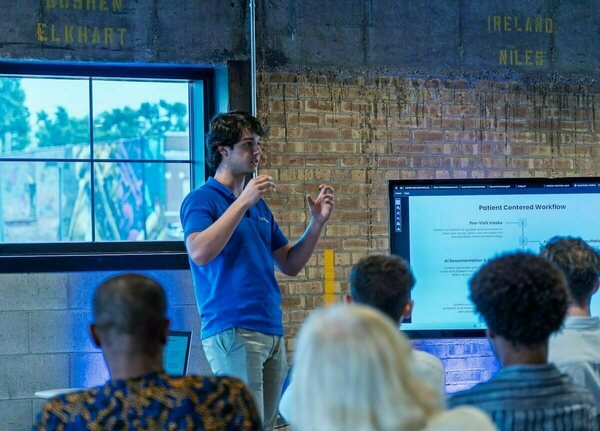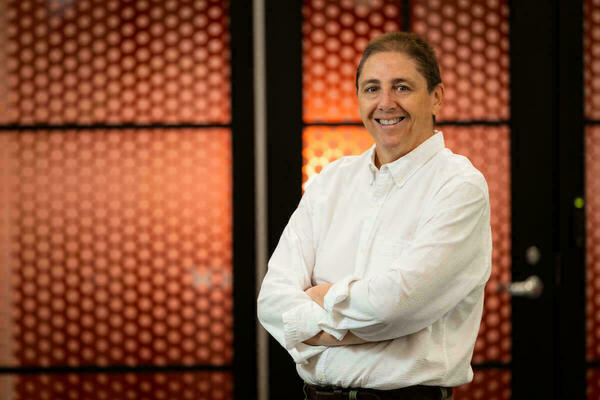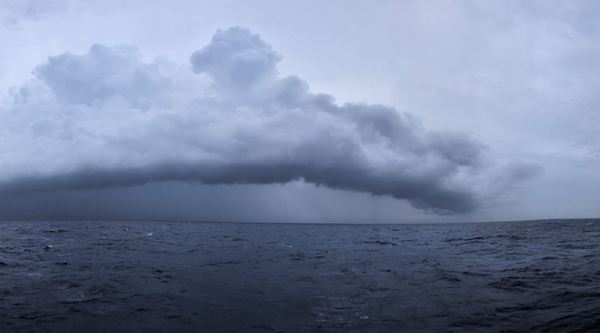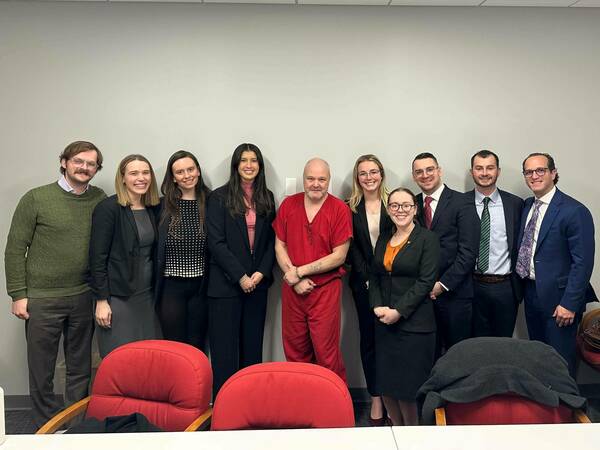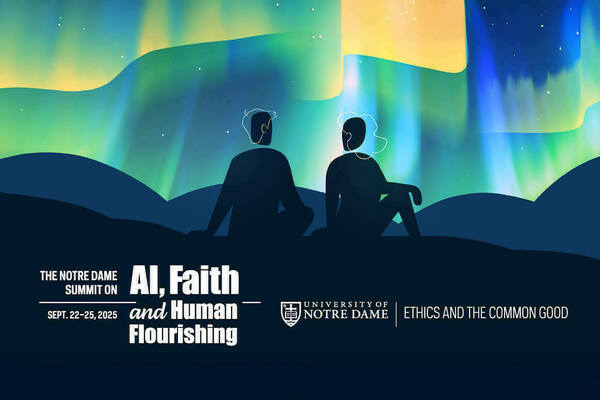Through impactful partnerships, ND Mexico brings record number of undergraduate students to Notre Dame for research

When he applied to Notre Dame for his Ph.D. program, Axel Gonzalez Cornejos had only been to campus once before. A student of the University of Guadalajara, Axel came to Notre Dame last summer for a short-term research program. The week he spent on campus had enough of an impact that when it came time to apply for graduate schools, Notre Dame made the list. This fall, he returned to campus as a Ph.D. student in the Aerospace and Mechanical Engineering Department.
In the past two years alone, over 100 undergraduate students from Mexico have come to Notre Dame’s campus for short-term research programs, like the one Axel participated in. For some, that experience has led them to return for graduate programs. This pathway is no accident—it’s the result of renewed efforts to create and fund more opportunities for Mexican students here at the University.
Since Maria Mercedes Salmon joined the Notre Dame Mexico team as director last year, she has used her background in higher education networking and advising to establish new partnerships with the US and Mexican state governments. These partnerships have provided funding and support for Mexican students seeking research opportunities beyond what local institutions can offer.
In her previous role as the Regional Educational Advising Coordinator (REAC) for Canada, Mexico, Central America, and the Caribbean, Maria Mercedes helped promote higher education internationalization between the United States and an extremely socio-economically diverse sub-region of the Americas. Prior to assuming REAC responsibilities, she was the EducationUSA country coordinator, Fulbright Foreign Student program officer, and acting executive director at the Fulbright Commission in Ecuador. This background has uniquely equipped her to take on the challenge of building pathways to bring motivated, research-minded students from Mexico to Notre Dame.

Students at Chicago’s Science and Industry Museum
“There is a gap in what industries need and what education and training institutions are providing,” Maria Mercedes shares. “In order for economic potential to develop and grow, we need to invest in quality education.”
The consequences of this gap were made especially clear in the wake of the pandemic when the US and other nations realized how dependent they were on foreign production of semiconductors. In response, the CHIPS and Science Act was established, marking a historic investment in “curiosity-driven, exploratory research and use-inspired, translational research” and a commitment to training the next generation of the STEM workforce. Part of this act involved the US State Department partnering with the governments of other nations, including Mexico, to distribute the funds.
Mexican governments responded eagerly—and Maria Mercedes and the ND Mexico team have worked with them to create unique opportunities for local students to gain research experience in STEM fields.
The fruit of their efforts, made possible through collaboration with the Global Engagement Programs team, was the creation of two new short-term programs this year that brought nearly 70 Mexican students to campus. In April, the Secretaría de Investigación, Innovación y Educación Superior de Yucatán (the Yucatán state government) sponsored 35 Mexican students for the International Spring: America and the World Today program. In June, an additional 35 students were sponsored by Consorcio Querétaro (the Querétaro state government), the U.S. Embassy and the US-Mexico Commission for Educational & Cultural Exchange (COMEXUS), through the Bicentennial Ambassador Scholarship program to campus for the International Summer: Technology, Engineering, and Sciences program.

Querétaro Ambassador Scholars before their
departure to Notre Dame
COMEXUS, in particular, has been an important partner for ND Mexico. Last year, COMEXUS collaborated with ND Mexico to send 12 Mexican students to campus for the iSURE program and 45 for the first iSTES program. After receiving an overwhelming number of applications last summer, this year COMEXUS helped fund a hybrid program—Science, Technology, and Engineering for our Common Home (STECH)—that would allow more students to participate and experience campus for a week.
Axel, who participated in the STECH program, emphasized that the work begins long before they come to Notre Dame’s campus. These are students who are working exceptionally hard at their local institutions and still want to push themselves further. When you arrive, as Axel puts it, “You got to show what you’re capable of.”
Certainly, Axel has done just that with his return to campus to pursue his Ph.D. in Robotics and Controls. And he’s not the only one to make the decision to return.
Raúl Chávez Ramírez, a first-year Ph.D. student in the Department of Chemical and Biomolecular Engineering, chose to return to Notre Dame after participating in a summer research program here. His decision was largely impacted by the environment and mission of the University.
“I really like the community here at Notre Dame. People are very cheerful, very united,” Raúl shares. “I also like the philosophy of Notre Dame of the force for good, so you can use the research to make the world a better place.”

An increasing number of graduate students are coming from Mexico to complete their studies at Notre Dame as Fulbright scholars, thanks to their initial introduction to the University through these immersive short-term programs.
One important element of the programs is the direct collaboration with faculty. Edgar Bolívar-Nieto, assistant professor of aerospace and mechanical engineering, was paired with students last year through the iSURE program. When asked why he chose to participate, Edgar shared that the program “had the potential to be a transformative experience for the students and an opportunity to interact with potential future members in my laboratory.” Based on his experience working with the group of Mexican iSURE students, he said he would “recommend it to anyone interested in understanding the classroom dynamics from a different country without leaving campus.”
At Notre Dame, these students find research and networking opportunities that can both propel their futures forward and impact the communities they come home to. They bring to Notre Dame their academic drive and a unique perspective shaped by cultural experiences outside of South Bend, Indiana. As the University makes strides to become more globalized, partnerships with organizations like COMEXUS are an essential component. By forming these relationships, ND Mexico has been able to convey the demand for more research opportunities among local students and advocate for Notre Dame as an excellent option for advanced research experience. The record number of Mexican students speaks for itself—the partnerships are effective, and they’re serving the needs of students and the wider University community.
Originally published by at mexico.nd.edu on November 06, 2024.
Latest Research
- Fighting for Better Virus DetectionAn electronic nose developed by Notre Dame researchers is helping sniff out bird flu biomarkers for faster detection and fewer sick birds. Read the story
- Notre Dame’s seventh edition of Race to Revenue culminates in Demo Day, a celebration of student and alumni entrepreneurship…
- Managing director brings interdisciplinary background to Bioengineering & Life Sciences InitiativeThis story is part of a series of features highlighting the managing directors of the University's strategic initiatives. The managing directors are key (senior) staff members who work directly with the…
- Monsoon mechanics: civil engineers look for answers in the Bay of BengalOff the southwestern coast of India, a pool of unusually warm water forms, reaching 100 feet below the surface. Soon after, the air above begins to churn, triggering the summer monsoon season with its life-giving yet sometimes catastrophic rains. To better understand the link between the formation of the warm pool and the monsoon’s onset, five members of the University of Notre Dame’s Environmental Fluid Mechanics Laboratory set sail into the Bay of Bengal aboard the Thomas G. Thompson, a 274-foot vessel for oceanographic research.
- Exoneration Justice Clinic Victory: Jason Hubbell’s 1999 Murder Conviction Is VacatedThis past Friday, September 12, Bartholomew County Circuit Court Judge Kelly S. Benjamin entered an order vacating Exoneration Justice Clinic (EJC) client Jason Hubbell’s 1999 convictions for murder and criminal confinement based on the State of Indiana’s withholding of material exculpatory evidence implicating another man in the murder.
- Notre Dame to host summit on AI, faith and human flourishing, introducing new DELTA frameworkThe Institute for Ethics and the Common Good and the Notre Dame Ethics Initiative will host the Notre Dame Summit on AI, Faith and Human Flourishing on the University’s campus from Monday, Sept. 22 through Thursday, Sept. 25. This event will draw together a dynamic, ecumenical group of educators, faith leaders, technologists, journalists, policymakers and young people who believe in the enduring relevance of Christian ethical thought in a world of powerful AI.








